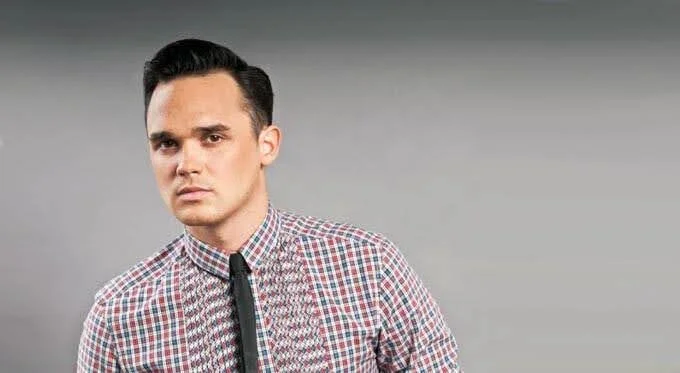From pop idol to public speaker: Gareth Gates on overcoming adversity through music
Gareth Gates, one of the UK’s most recognisable music acts speakers, has transformed his early challenges into a powerful message of resilience and purpose.
Rising to fame as the runner-up on the first season of Pop Idol, Gareth captivated the nation not only with his vocal talent but also his honesty in speaking about life with a stammer.
In this exclusive interview with The Champions Speakers Agency, he reflects on the role music played in helping him find his voice - both literally and figuratively - and shares the key lessons he now brings to the stage as an inspirational speaker.
Q: Your journey has been shaped by overcoming a speech impediment from an early age. Can you take us back to how that experience defined you and influenced your personal and professional development?
Gareth Gates: “Today, well, for as long as I can remember, I've had a stammer. As a child at school, I could barely get one word out my mouth.
“Reading aloud in class was traumatic. Answering a register was hell. And I once peed myself in front of the entire class because I couldn't ask the teacher to go to the toilet. Quite humorous now, but pretty mortifying in the moment.
“You know, lads would hold me down in the playground and beat the words out of me, as they'd say. And so, you know, life was pretty tough.
“But all my childhood and into adolescence, having a stammer was a real burden for me, right up until that first audition on Pop Idol, which was actually 22 years ago now.
“I feel very old. But my stammer was always a negative up until that moment. I was badly bullied at school because of it. It caused me constant pain and upset and embarrassment.
“But the very thing that caused me all that hurt actually became the one thing that made me stand out from the crowd.
“Up until that moment, being different was a very negative thing. I tried so desperately to fit in and to not cause a fuss, to not stand out from the crowd for all the wrong reasons.
“Actually, for the first time, being different was a good thing. Having a stammer was a positive thing because it got me noticed.
“It created a story that people could latch onto. I was the boy that couldn't speak but could sing amazingly.
“And I'm sure there's things, you know, that you are going through, or maybe you have an affliction that holds you back. But maybe that's the very thing that makes you the thing that sets you apart from everybody else.
“And although it's hard to recognise when you're going through that hurt, I encourage you to persevere and to push on, because these things make us stronger and make us the people we are.”
YOU MAY ALSO LIKE: PinkPantheress faces racial bias in electronic music despite chart-topping hit
Q: You’ve spoken about how music offered you a lifeline when traditional communication felt out of reach. How did performing become your outlet and ultimately your strength?
Gareth Gates: “Today, at the age of eight, my first school was producing a production of Joseph and His Amazing Technicolour Dreamcoat.
“Now, I was a very shy boy with a stammer, but somehow I decided to go along to the auditions with my friends - again, probably just to try and fit in with them.
“And part of the audition process was the school asking us to sing a small section of music. Now, up until that point in my life, I could barely get one word out of my mouth, so nobody, especially me, was expecting much from me being able to sing.
“But when they did ask me to sing, all of a sudden these words just came flooding out my mouth fluently, effortlessly, without any struggle or tension.
“And this completely changed my world. Finally, I could express myself. I could get out of me what was in me.
“And I absolutely loved it - so much so that I began to learn to express myself on several musical instruments: the guitar, the piano, the drums. I mean, my poor parents had to endure hours of me creating a racket on all of my instruments.
“But, you know, I was dealt a difficult hand in life - the inability to speak and the inability to communicate. And I could have just settled for that and let my affliction dictate the life I was to lead and was to live.
“But as soon as I found that something that I could excel at, I knew I had to put my all into that. I had to switch my energy from what I couldn't do to what I was able to do and what I did well and what I excelled at.
“And I think we all have things in life that we struggle with, but we also all have things that we're good at. And I urge you today to find your thing, to find that trait or that gift that you're good at.
“You know, and it may take some time to find your calling or your path, but persevere, because once you do, everything changes. My life certainly changed in an instant.
“I went from being a shy boy that couldn't speak to people applauding me when I sang fluently. I could have very easily given up, but I knew from a young age that I wasn't going to accept what I was given in life.
“I knew I was destined for more, and I think that belief and that drive and determination is the reason I've achieved what I have.”
ALSO ON MNB: Tyla ignites summer with ‘WWP,’ a four-track party in under 12 minutes
Q: When you step on stage now as a speaker, what is the message you most want audiences to take home - especially those who might be facing their own limitations?
Gareth Gates: “Today, in my speeches, I talk about lots of things, but the main points I try to get across is to encourage you to find your thing.
“I've always suffered with a speech impediment, but I realised as a child I could actually get words out of my mouth through music, and so that became my thing. I put everything into that. I shifted my focus from something I can't do to something I do well.
“And, you know, we all have things in our life that we do excel at, and so to find your thing and to really, really put all your energy into that.
“I also like to encourage people to find a mentor and to stick with the winners - to rub shoulders with people who are going to inspire you to be better.
“And finally, which is the biggest thing I try and encourage people to do, is to face their fears.
“You know, me standing in front of you today speaking is my biggest fear, and I hope to plant a seed to encourage you to do the same - because if I can do it, then so can you.”
This exclusive interview with Gareth Gates was conducted by Chris Tompkins of The Motivational Speakers Agency.
READ NEXT: From BMX world champion to mental health advocate: Shanaze Reade’s journey




